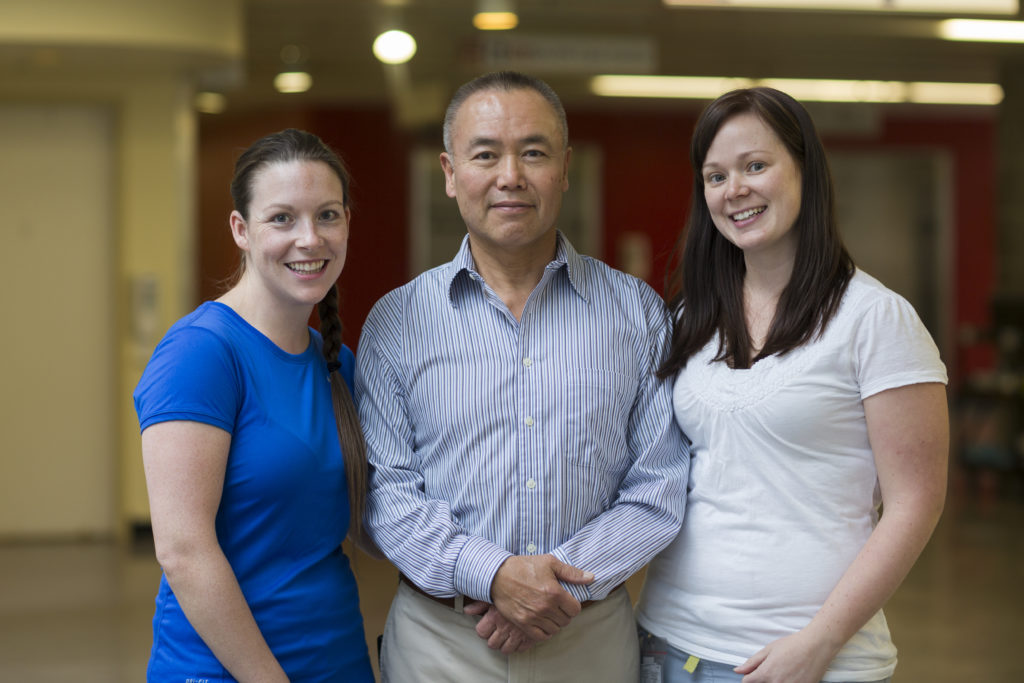
Nurses in action on and off duty: CPR saves lives
An unexpected emergency
Shannon Long and Angela Villeneuve have always kept their CPR credentials up to date. Both work at McMaster Children’s Hospital, Long, as a nurse in the Pediatric Intensive Care Unit (PICU) and Villeneuve as a nurse in the Neonatal Intensive Care Unit (NICU). In their fast-paced, high stakes jobs, they are prepared to leap into finely-tuned action at any moment. It’s that exact mentality that saved their friend’s life.
“As soon as his pulse rate slowed to almost stopping, we were ready to go.”
This past winter, they were finishing up swim practice when their friend, Ken Lam, began struggling in the water. A few members of their team helped him onto the deck. His wife was walking into the change room with Long, and someone rushed over to bring her back to her husband’s side. As soon as the two arrived at Lam, Long knew he was in cardiac arrest. Villeneuve had already called 9-1-1 and was explaining his symptoms to the dispatcher.
No time to second guess
“We just kind of took the lead and put our training into action,” says Long.
Someone took over the 9-1-1 call so Villeneuve could join Long in providing first aid. She hooked Lam up to an oxygen bag and started breathing for him. Long continuously checked his weakening pulse, ready to start CPR.
“As soon as his pulse rate slowed to almost stopping, we were ready to go,” says Long. “We started everything immediately. As soon as his pulse stopped, we started CPR so there was never a lack of oxygen to his brain.”
“It felt good to know that we were able to just flow through what we needed to do,” Villeneuve adds. “We knew what the other person was going to do and we worked together to save him.
“They walked in and said they had never seen a situation that could have been so bad go so smoothly.”
“I’m a charge nurse, so I have experience being in stressful situations, where a baby needs resuscitation. That prepared me for knowing how to communicate with everyone when Ken needed our help.”
After about fifteen minutes of CPR—the nurses took turns between compressions and assisted breathing—emergency services arrived.
“They walked in and said they had never seen a situation that could have been so bad go so smoothly,” Villeneuve says, of the paramedics’ reaction to the scene.
leaping back to life
The paramedics shocked Lam with a defibrillator three times before his pulse returned. He was taken to Joseph Brant Hospital in Burlington, then transferred to Hamilton General Hospital for further care. Investigation revealed that an arrhythmia had caused his heart to stop. He had a Cardioverter Implantable Defibrillator (ICD) inserted and is back to swimming and cycling multiple times a week.
“If they didn’t do CPR so quickly, I could have lost some function in the central nervous system,” says Lam. “Because they were so fast, I’m 100 per cent good.”
“I feel that I should enjoy life as much as I can. They are my lifesavers. They are my guardian angels.”
Lam is incredibly grateful for his friends’ quick intervention. He has a newfound appreciation for the importance of CPR training, and encourages everyone to learn.
“I feel that I should enjoy life as much as I can,” he says. “They are my lifesavers. They are my guardian angels.”
